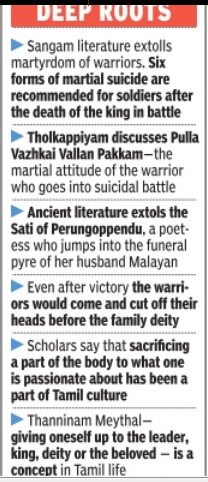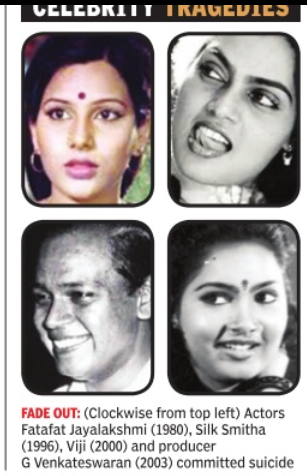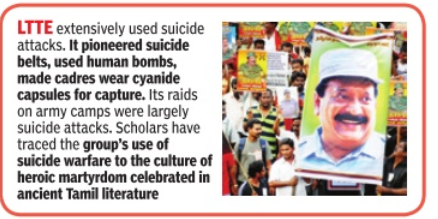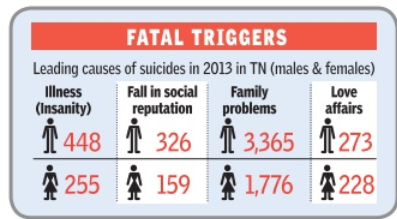Suicides in Tamil Nadu
This is a collection of articles archived for the excellence of their content.
|
A place where ending one’s life is an act of honour
Ekatha.Ann@timesgroup.com
The Times of India Jul 17 2014
AS POLITICS PROMOTES SUICIDE CULTURE, TAMIL NADU GOVT FAILS TO CAMPAIGN AGAINST MENACE
Contents |
Seemingly trivial triggers
2014: Easwaran, an ardent follower of Alagiri, torched himself after his leader was expelled from DMK.
2014: Twenty-year-old Senkodi immolated herself, demanding that the death penalty of the trio convicted in the Rajiv Gandhi assassination case be set aside.
Several years before: MGR's poor health triggered a similar response among fans.
The reasons may vary from unrequited love to political allegiance, but self-harm in the form of suicide is often celebrated in artistic expression in Tamil Nadu. Experts say that what makes matters worse is that the government ignores this social menace in contemporary Tamil society -and that may not be just due to negligence.
It is a state where politics celebrates and, at times promotes, suicide .
It may come as little surprise therefore that Tamil Nadu has for years been the nationwide topper in number of suicides. In 2013, the state logged over 16,000 such cases.
Celebrated in ancient culture…
Scholars say there are many celebratory references to suicide in Tamil classics and folk tales. Lakshmi Vijayakumar, founder of suicide helpline SNEHA, quotes from Tolkappiyam, which describes the death of poetess Perungoppendu, who entered the flames of the funer al pyre of her husband.
“Perungoppendu said she took that step not just to show her loyalty to her husband but also to explain the travails of living as a widow in society,” she said.
During the Sangam era, defeated Tamil warriors sat on a fast unto death sitting northwards.
Memorials were built for them which were called Nadukal (a stone erected on earth), which people worshipped. “In a popular reference, legendary Chera King Peruncheralathan sat on a fast after getting defeated at the hands of Karikala Cholan,” said writer Manushya Puthran. Sangam texts describe ritual suicide by warriors after their king falls in battle. Nallathangaal is another well known folk tale which depicts how a woman killed herself and her seven children, pushing them into a well, due to poverty . “She is still worshipped as a goddess in Archunapuram in Virudhunagar district. An annual fair is also held in her memory,” he said.
Stalin Rajangam, a writer based in Madurai, says such literary references cannot be taken to mean that suicide was a mass practice among common people in the past.
But they do indicate adherence to the idea of sacrificing oneself to a leader, which finds its echoes in today's Tamil Nadu.
…and in modern popular culture
It is not just ancient or contemporary texts that eulogise or celebrate suicide, but popular culture as well. Filmmaker K Hariharan said in at least 90% of suicides portrayed in movies the reason is because of failure in love.
“This has been a popular trend in movies, especially those made in the late 70's and early 80's. There are also instances of girls taking the extreme step because they have been ‘wronged’,” he said. “What we need to ask is what do the characters symbolise. It shows the dysfunctionality of the state as symbolised by the family. Suicide is not portrayed as an end but there's a certain valourisation of the act,” he said.
However, not all agree that films have a role to play.
“In films, the serious side of suicide hasn't been explored.
Suicide is always dramatized to add to the plot. However, I don't think movies push or prompt people to take the extreme step. I would say that films just portray reality,” said actor Rohini.
Suicides for political causes
Showing political allegiance or dying for a cause through self immolation is an unsettling practice in Tamil Nadu. Cluster suicides were reported during the anti-Hindi agitation in the 1930's. Vaiko's expulsion from DMK in 1993 triggered several cases of self-immolation.
Rajangam also cites the extensive use of suicide attacks as war strategy by the LTTE as possibly arising from a deep-rooted Tamil warrior culture. The Tigers may well have taken their cue from ancient codes, he says.
See also
Suicides: India Suicides in Tamil Nadu



